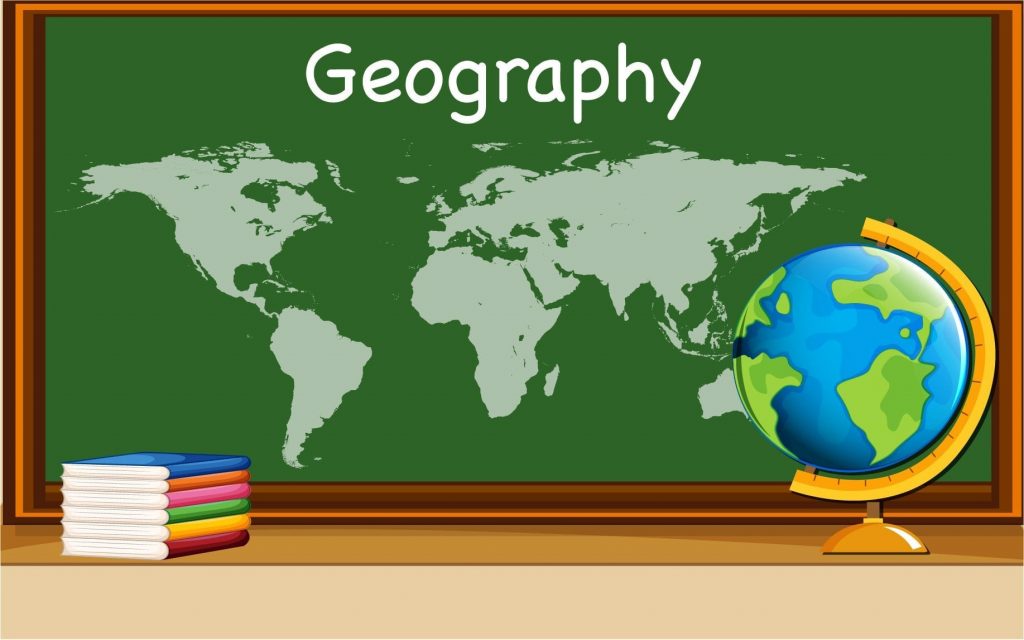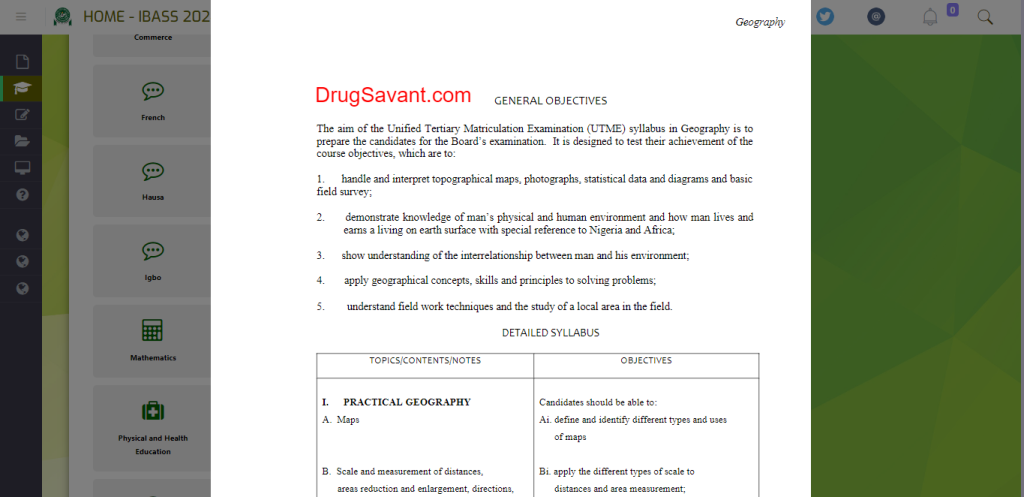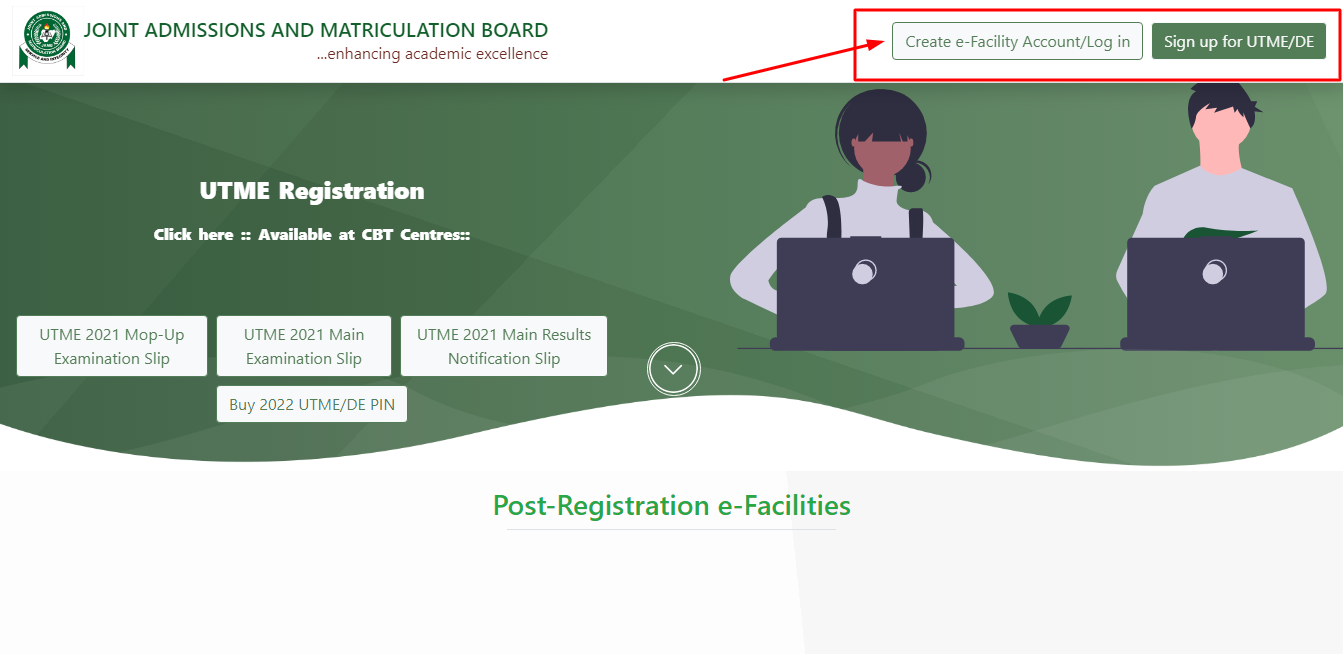JAMB Geography Syllabus 2024/2025: Is JAMB Syllabus for Geography out for this year’s JAMB? when will JAMB Geography syllabus be out?” what topics do JAMB set questions from Geography the most? what is the most repeated topic in JAMB Geography?
Welcome SAVANT! to another exciting episode of “JAMB Doctor Series“, in this episode we will provide you with the official topics recognize by JAMB, which you are expected to be a guru in before entering the hall to sit for your JAMB Geography Exam. STAY TUNED!

Have you ever wondered where you can find the topics for Geography JAMB normally asks or the most repeated topics or question in JAMB Geography? then you are a step away from finding your answer.
The short answer to the above question is “JAMB Syllabus”, in fact, JAMB Syllabus is the only expo you will be getting as you prepare for 2024/2025 UTME Exams, this syllabus contains area of concentrations and topics your questions will be asked from.
Read Also: WAEC Marking Scheme For All subjects: Grading System
ARE YOU ON TELEGRAM? Subscribe To My Telegram Channel For Frequent Updates & Guide by clicking the "SUBSCRIBE NOW" button below.
Any smart students would cherish this piece (Syllabus) and make effective use of it, the fact that you are searching for this now, simply means you are in the right direction. you should see my top notch guide on How To Pass JAMB With High Score (300+).
What Is JAMB Geography Syllabus?

JAMB Syllabus for Geography is a collection of topics the board expects you to be well grounded in before the exam.
If Geography is one of the subjects you will sit for in JAMB, then you need this syllabus, these were compiled by JAMB so it is something you can rely on.
Read also: JAMB Profile 2024/2025: How To Create & Access It (All To Know)
JAMB Syllabus For Geography

JAMB Geography syllabus is designed to evaluate your ability to:
- Handle and interpret topographical maps, photographs, statistical data and diagrams, and basic
field survey; - Demonstrate knowledge of man’s physical and human environment and how man lives and earns a living on earth surface with special reference to Nigeria and Africa;
- Show understanding of the interrelationship between man and his environment;
- Apply geographical concepts, skills, and principles to solving problems.
- Understand fieldwork techniques and the study of a local area in the field.
Download your copy of the syllabus using the download button below👇
Below is a detailed syllabus for JAMB Geography, you can bookmark this page for easy access to this page. ENJOY!
I. PRACTICAL GEOGRAPHY
A. Maps
Objectives:
You should be able to:
- Define and identify different types and uses of maps
B. Scale and measurement
Topics:
- distances, areas reduction and enlargement, directions, bearings, and gradients with reference to topographical maps.
C. Map reading and interpretation;
Topics:
- drawing of cross profiles, recognition of intervisibility, recognition, and description of physical and human features and relationship as depicted on topographical maps.
D. Interpretation of statistical data;
Topics:
- Maps and diagrams
E. Elementary Surveying;
Topics:
- Chain and prismatic.
- Open and close traverse.
- Procedure.
- Problems.
- Advantages and disadvantages.
F. Geographic Information System (GIS):
Topics:
- Components.
- Techniques.
- Data.
- Sources.
- Applications
II. PHYSICAL GEOGRAPHY
A. The earth as a planet
Topics:
- The earth in the solar system, rotation and revolution;
- The shape and size of the earth
- Land distances, longitudes and time
B. The Earth Crust
Topics:
- The structure of the earth (internal and external) Relationships among the four spheres.
- Rocks: Types, characteristics, modes of formation and uses
- Earth’s movement: Tectonic forces
- Major Landforms: Mountains, Plateaux, Plains, Coastal landforms, karst topography and desert landforms
C. Volcanism and Earthquakes
Topics:
- landforms associated with volcanic activities
- landforms of Igneous Rocks
- origin and types of Volcanoes
- some volcanic eruptions and earthquakes
D. Denudation processes in the tropics
Topics:
- weathering
- erosion
- mass movement
- deposition
E. Water Bodies
Topics:
- Oceans and seas (world distribution, salinity, and uses)
- Ocean currents – types, distribution, causes, and effects;
- Lakes – types, distribution and uses.
- Rivers: Action of running water.
F. Weather and Climate
Topics:
- Concept of weather and climate
- Elements of weather and climate
- Factors controlling weather and climate (pressure, air mass, altitude, continentality, and winds)
- Classification of climate (Greek and Koppen).
- Major climate types (Koppen), their characteristics, and distribution.
- Measuring and recording weather parameters and instruments used.
- The basic science of climate change.
G. Vegetation
Topics:
- Factors controlling growth of plants
- The concept of vegetation e.g. plant communities and succession
- Major types of vegetation, their characteristics and distribution,
- Impact of human activities on vegetation.
H. Soils
Topics:
- Definition and properties
- Factors and processes of formation
- Soil profiles
- Major tropical types, their characteristics, distribution and uses;
- Impact of human activities on soils.
I. Environmental Resources;
Topics:
- Types of resources (atmospheric, land, soil, Vegetation and minerals)
- The concept of renewable and non- renewable resources;
J. Environmental interaction:
Topics:
- Land ecosystem
- Environmental balance and human interaction
K. Environmental hazards:
Topics:
- Natural hazards (droughts, earthquakes, volcanic eruptions, flooding)
- Man-induced (soil erosion, deforestation, pollution, flooding and desertification)
- Effects, prevention and control of hazards.
L. Environmental Conservation
III. HUMAN GEOGRAPHY
A. Population
Topics:
- World population with particular reference to the Amazon Basin, N.E. U.S.A., India, Japan and the West Coast of Southern Africa.
- Characteristics – birth and death rates, ages/sex structure.
- Factors and patterns of population distribution;
- Factors and problems of population growth.
B. Settlement with particular reference to Western Europe, the USA, Middle East and West Africa:
Topics:
- Types and patterns: rural and urban, dispersed, nucleated and linear;
- Rural settlement: classification, factors of growth and functions;
- Urban settlement – classification, factors of growth and functions.
- Problems of urban centres
- Interrelationship between rural and urban settlements.
C. Selected economic activities
Topics:
- Types of economic activities: primary, secondary, tertiary and quartnary;
- Agriculture: types, system, factors and problems
- Manufacturing industries, types, locational factors, distribution and socio- economic importance and problems of industrialization in tropical Africa.
- Transportation and Communication types, roles in economic development and communication in tropical Africa.
- World trade-factors and pattern of world trade, major commodities (origin, routes and destinations).
- Tourism: definition, importance, location, problems and solutions.
IV. REGIONAL GEOGRAPHY
A. Broad outline of Nigeria
Topics:
- Location, position, size, political division (states) and peoples;
- Physical settling: geology, relief, landform, climate and drainage, vegetation and soils;
- Population: size, distribution, migration, (types, problems and effects);
- Natural Resources: types (minerals, soils, Water, vegetation etc) distribution, uses and conservation.
B. Economic and Human Geography:
Topics:
- Agricultural Systems: the major crops produced, problems of agricultural development in Nigeria.
- Manufacturing Industries: factors of location, types of products, marketing and problems associated with manufacturing;
- Transportation and Communication: modes of transportation and communication and their relative advantages and disadvantages;
- Trade: Regional and International Trade, advantages and disadvantages;
- Tourism: types, importance, problems, and solutions.
C. ECOWAS
Topics:
- Meaning and objectives
- Member states
- Advantages and benefits
- Disadvantages, problems, and solutions
Frequently Asked Questions
How Many Questions JAMB Sets In Geography?
The total number of questions JAMB asked in Geography is 40, with each question carrying 2.5 marks.
This means if after answering Geography, you were able to answer 30 questions correctly in JAMB you have been able to secure 75 marks for yourself.
JAMB Recommended Textbooks For Geography
To make sure your reading is inline with what your should know, JAMB has prepared a list of textbooks that will help you achieve that purpose.
Is JAMB Geography Syllabus For 2024 Out?
Yes, JAMB syllabus for Geography is out.
In Conclusion
It is advisable you go through these topics listed here, as they would help you have a more directed preparation and reading for JAMB Geography.
This will be all for now, I understand you may have a question or two to ask, feel free to drop them using the comment box below!
Ensure to share this with friends on Facebook, Whatsapp, or any other social media network you can connect them with…
Related Searches... a. Jamb geography syllabus pdf b. jamb syllabus c. download geography syllabus d. jamb syllabus for science courses
JAMB SYLLABUS FOR OTHER SUBJECTS... A. JAMB English Syllabus B. JAMB Mathematics Syllabus C. JAMB Syllabus For Physics D. JAMB Chemistry Syllabus E. JAMB Syllabus For Biology F. JAMB Economics Syllabus G. JAMB Syllabus For Christian Religious Studies (CRS) H. JAMB government Syllabus I. JAMB Syllabus for Commerce J. JAMB Literature in English Syllabus K. JAMB Computer Studies Syllabus



